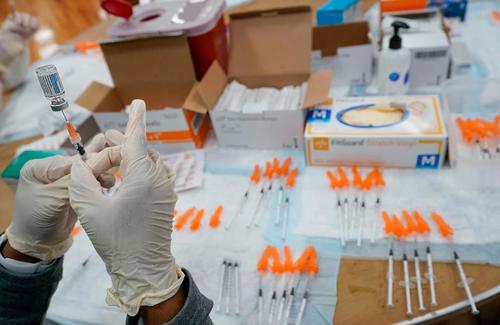by TYLER DURDEN
Readers may remember earlier this year when an accident at the Emergent Biosolutions lab in Baltimore led to millions of J&J and AstraZeneca doses being ruined (after workers cross-contaminated them with ingredients from AstraZeneca jabs being produced in the same factory).
Since the incident, the FDA has been reviewing safety and production procedures at the facility. But despite the US government handing over control to J&J, attempts to re-start production have been in limbo, and according to the NYT, another 60MM doses produced at the facility didn’t meet the agency’s safety standards.
In a statement, the F.D.A. said that before making its decision, it “conducted a thorough review of facility records and the results of quality testing performed by the manufacturer.” It also considered the ongoing public health emergency. The agency said it was continuing to “work through issues” at the Baltimore plant with Johnson & Johnson and Emergent.
Dr. Peter Marks, the F.D.A.’s top vaccine regulator, said in the statement that the agency has been conducting an extensive review of batches of vaccine produced at the plant “while Emergent BioSolutions prepares to resume manufacturing operations with corrective actions to ensure compliance with the F.D.A.’s current good manufacturing practice requirements.”
Representatives from Johnson & Johnson and Emergent declined to comment on the agency’s decision.
Fortunately for President Biden, the US already has enough Pfizer and Moderna doses to satisfy domestic demand. But the latest production hiccup will make it more difficult for the US to export doses to countries around the world in desperate need of them.
Of the ruined doses, 10MM will be sold in the US, and abroad with a special warning label that regulators can use for drugs that are in short supply. The warning will read that “regulators cannot guarantee that Emergent BioSolutions, the company that operates the plant, followed good manufacturing practices.”
The F.D.A.’s action is disappointing news for Emergent and Johnson & Johnson, which hired the firm as a subcontractor. Inspectors are still reviewing the plant and are not expected to decide whether the company can reopen it until later this month, according to people familiar with the situation. Regulators are also continuing to cast doubt on whether the company, which has been paid hundreds of millions of dollars by the federal government to manufacture coronavirus vaccines, adhered to manufacturing standards.
The agency’s plan to allow 10 million doses to be used in the United States or abroad with a warning is somewhat unusual for a product under emergency authorization, experts said. Regulators have the discretion to take that action if the drugs are badly needed and in short supply, they said.
In a statement, the FDA said that before making its decision, it “conducted a thorough review of facility records and the results of quality testing performed by the manufacturer.” It also considered the ongoing public health emergency. The agency said it was continuing to “work through issues” at the Baltimore plant with Johnson & Johnson and Emergent.
But the real issue here is that after months of scrutiny and interrupted production, the Emergent factory, a key piece of America’s vaccine infrastructure, still isn’t producing anywhere near full capacity.
The FDA hasn’t decided yet whether the factory should be placed back under Emergent’s control. So far, doses produced at the factory have played little to no role in the US vaccination program. Most of the J&J doses administered in the US so far were manufactured at the company’s plant in the Netherlands. For weeks now, the FDA has been trying to figure out what to do about at least 170MM doses of the vaccine that were left in limbo after the discovery of the production mishap mentioned above.
While the loss of 60MM J&J doses that could have been sold or donated is certainly “a blow” to the Biden Administration’s vaccine policy, the White House announced earlier this week that the US had agreed to purchase 500MM more doses from Pfizer and Moderna at cost provided the vaccines are donated to other countries with greater need.






